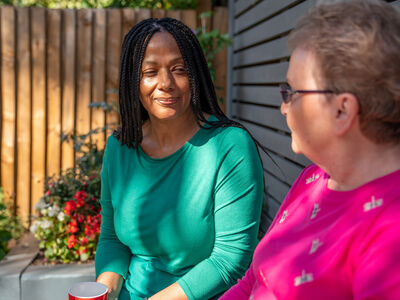1. What is secondary breast cancer?
Secondary breast cancer occurs when breast cancer cells spread from the primary (first) cancer in the breast to other parts of the body. Breast cancer cells can spread through the or the blood stream.
You may hear secondary breast cancer referred to as:
- Metastatic breast cancer
- Metastases
- Advanced breast cancer
- Secondary tumours
- Secondaries
- Stage 4 breast cancer
The most common areas breast cancer spreads to are the:
Sometimes other parts of the body, such as the in the chest, armpit or neck area, the skin or abdomen (belly), are affected.
Where it spreads and to how many sites varies with different types of breast cancer and in different people.
When breast cancer spreads to the bones, for example, it’s called secondary or metastatic breast cancer in the bone. The cancer cells in the bone are breast cancer cells. It is not the same as having cancer that starts in the bone.
2. De novo metastatic breast cancer
Secondary breast cancer usually occurs years or sometimes months after primary breast cancer, but for some people it’s diagnosed at the same time as the or before the primary breast cancer has been discovered.
This is referred to as ‘de novo’ (which means ‘new’) metastatic breast cancer.
De novo metastatic breast cancer is sometimes referred to as being ‘treatment naive’ because it has not previously been treated with any anti-cancer treatments. This may mean that the cancer may be more responsive to treatment.
3. Can secondary breast cancer be cured?
Secondary breast cancer can be treated, but it can’t be cured. Treatment aims to control the cancer, relieve any symptoms, and maintain health, wellbeing and a good quality of life for as long as possible.
4. How long do people live with secondary breast cancer?
One of the first things many people with secondary breast cancer want to know is how long they’ve got to live.
Life expectancy is difficult to predict, as each person’s case is different and no two cancers progress (spread or develop in new areas) in the same way. However, as treatments have improved, more and more people are living longer after a diagnosis of secondary breast cancer.
Your specialist can talk to you about how the secondary breast cancer may progress. You may worry if their answers are vague, but it isn’t possible to accurately predict how each person’s cancer will respond to treatment.
5. Coping with a diagnosis of secondary breast cancer
A diagnosis of secondary breast cancer often comes as a very big shock.
You may experience many different emotions, including disbelief, denial, anger, fear, numbness and helplessness. Your emotions may swing from one extreme to the other or change from one day to the next.
Many people go through this stage before reaching a point where they’re able to start taking some control of their situation. However difficult it may seem, you can have some control over how you manage the illness and deal with the emotional and practical issues it brings.
Talking to other people
Talking about how you’re feeling can often help you cope in the early days. You may be able to do this with family and friends, but many people find this very difficult.
Talking with a specialist nurse can often help. You can ask to be put in contact with one if you haven’t already.
We are also here to help you. Through our services you can:
- Call our free helpline on 0808 800 6000
- Chat to other people living with secondary breast cancer on our forum
- Meet other people with a secondary diagnosis and get information and support at a Living with Secondary Breast Cancer group - more information about this can be found at the end of the page
6. Treatment for secondary breast cancer
The aim of treatment for secondary breast cancer is to:
- Control and slow down the spread of the cancer
- Relieve symptoms
- Maintain health and wellbeing
- Give you the best quality of life for as long as possible
7. Living with secondary breast cancer
Everyone’s experience of being diagnosed with secondary breast cancer is different, and people cope in their own way.
For many people, uncertainty can be the hardest part of living with secondary breast cancer.
Our information on living with secondary breast cancer addresses the emotional, practical and physical effects of a diagnosis.




